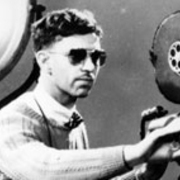
Stan Wemyss
During a career that spanned at least four decades, Stan Wemyss did time as a Government cameraman, was part of a busy commercials company, and made shows for television. Wemyss would carry his love of film down the line; when Russell Crowe won an Oscar for Gladiator, he made a point of thanking Wemyss, his grandfather on his mother's side, for having provided inspiration.
Stanley James Wemyss was born in the Wairarapa town of Carterton, in 1916. Wemyss was working as an artist when he joined the Government Film Studios in 1938. At this point the organisation handled both filmmaking and posters, much of it aimed at tourists. When WWII began, the government's filmmaking efforts were rechannelled with an eye to publicising the war effort, and the New Zealand National Film Unit was born. By 1941 Wemyss had become a cameraman, and was one of a small number of New Zealanders heading overseas to film Kiwi forces abroad.
Although Wemyss filmed for a few months in North Africa, hopes of relieving cameramen for the NZ Army Film Unit were thwarted, partly because he was classified as a civilian.
Wemyss had more luck — plus some very close calls — on the island of Bougainville (later part of Papua New Guinea). There he filmed Fijian troops fighting in close quarters against unseen Japanese troops, for the Weekly Review newsreel series. Some of that footage can be seen in Weekly Review No. 140 - Easter Action on Bougainville. Wemyss was interviewed about the encounter for the 'Final Peace' episode of The Years Back series; he described being close enough to the action to hear troops talking in two languages he couldn't understand, and at one point pitching a grenade himself. In 1947, "on the advice of His Majesty's New Zealand Ministers", Wemyss was awarded an MBE for his services as a war correspondent.
In the period after the end of the war, he also travelled across Asia following New Zealand prisoners of war, for Weekly Review No. 215.
Rare images of Wemyss at the film unit can be seen at the start of 1947 short Exhibition Loop. In 1950 Wemyss left the job, and began a decade running the Vogue Cinema (now the Penthouse) in Wellington, with his wife Joy. The following decade his career took another new path, when he began making commercials with Kelvin Peach and his father Noel. The latter were based in Auckland, while Wemyss filmed in the Vogue, which closed as a cinema in 1963. Originally known by the company name Peach Wemyss, the business was also variously known as Peach Wemyss Astor and PWA Film Productions.
Wemyss was a prolific producer of commercials over at least three decades, along the way handling high profile clients like Hoover, Batts, and Fisher and Paykel. Under the title Film Makers, the company also made industrial films documenting a number of Ministry of Works roading projects, and produced a children's puppet show for the state broadcaster in the first half of the 60s.
The following decade Wemyss directed a story on Māori tribal land for doco slot Survey. In 1974 he produced one of his only fictional projects, after Peach Wemyss Astor joined forces with a bunch of emerging Wellington talents from the Blerta performance collective. The result was one-off television drama Uenuku, directed by Geoff Murphy. This respectful adaptation of the Māori legend of Hinepūkohurangi marked one of the first times a Māori story appeared on New Zealand television. It was also the first screen production to use all te reo dialogue.
Stan Wemyss continued to work on commercials for many years after Uenuku. He passed away in 1988.
Sources include
Clive Sowry
Trisha Dunleavy, Ourselves in Primetime: A History of New Zealand Television Drama (Auckland University Press, 2005)
Lawrence McDonald, 'From Holland to Holyoake: Film in the 1950s and 1960s' in New Zealand Film - An Illustrated History Editor Diane Pivac with Frank Star and Lawrence McDonald (Wellington: Te Papa Press, 2011)
Geraldene Peters, 'Political and Alternative Film Making: 1940 to 1950' in New Zealand Film - An Illustrated History (details in above entry)
'National Film Unit Films with credit to Stan J. Wemyss' (Archives New Zealand document) - Supplement to the London Gazette, 1 July 1947, page 3010
The Years Back - The Final Peace (Television Documentary) Director Derek Wright (National Film Unit, New Zealand Broadcasting Corporation, 1973)